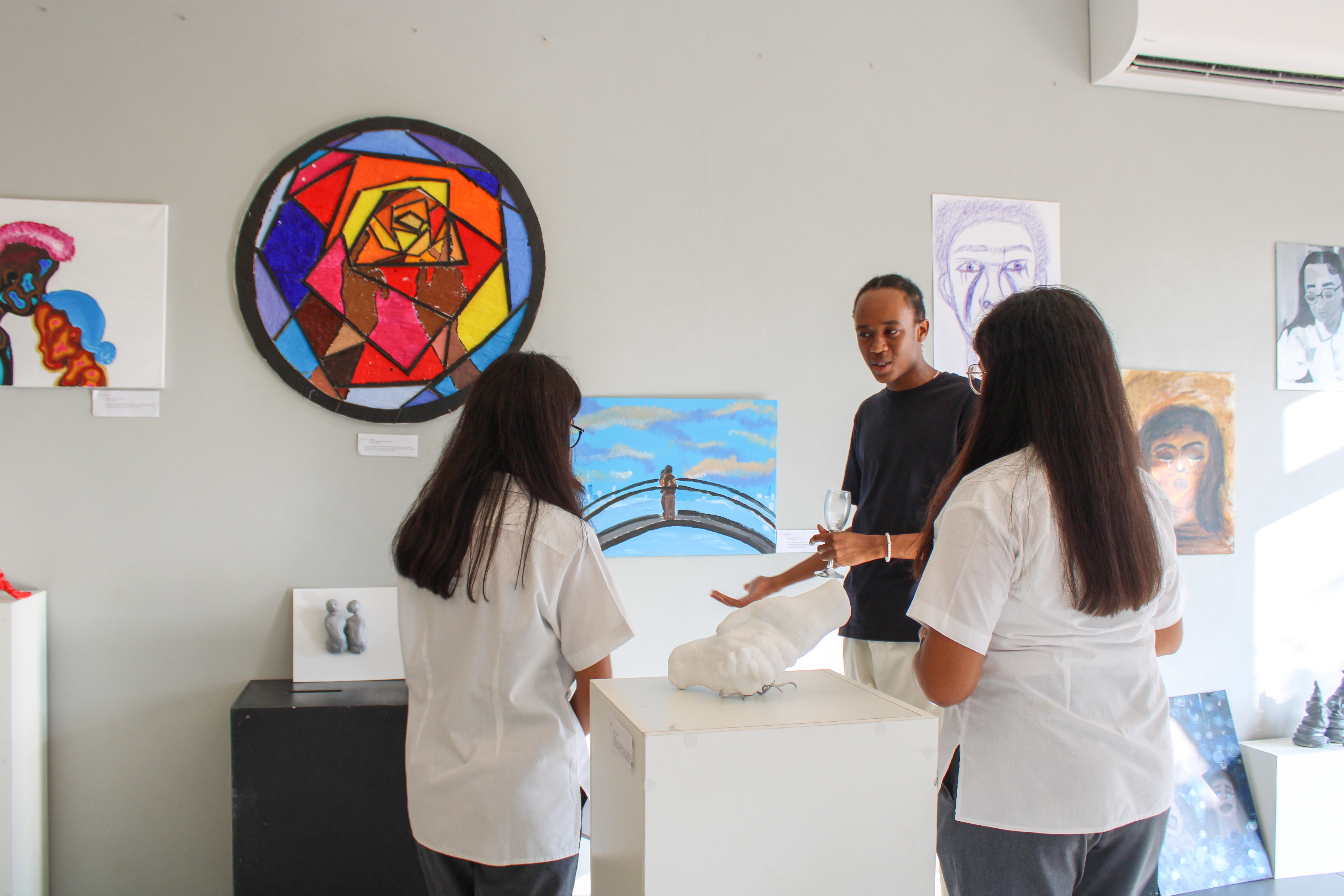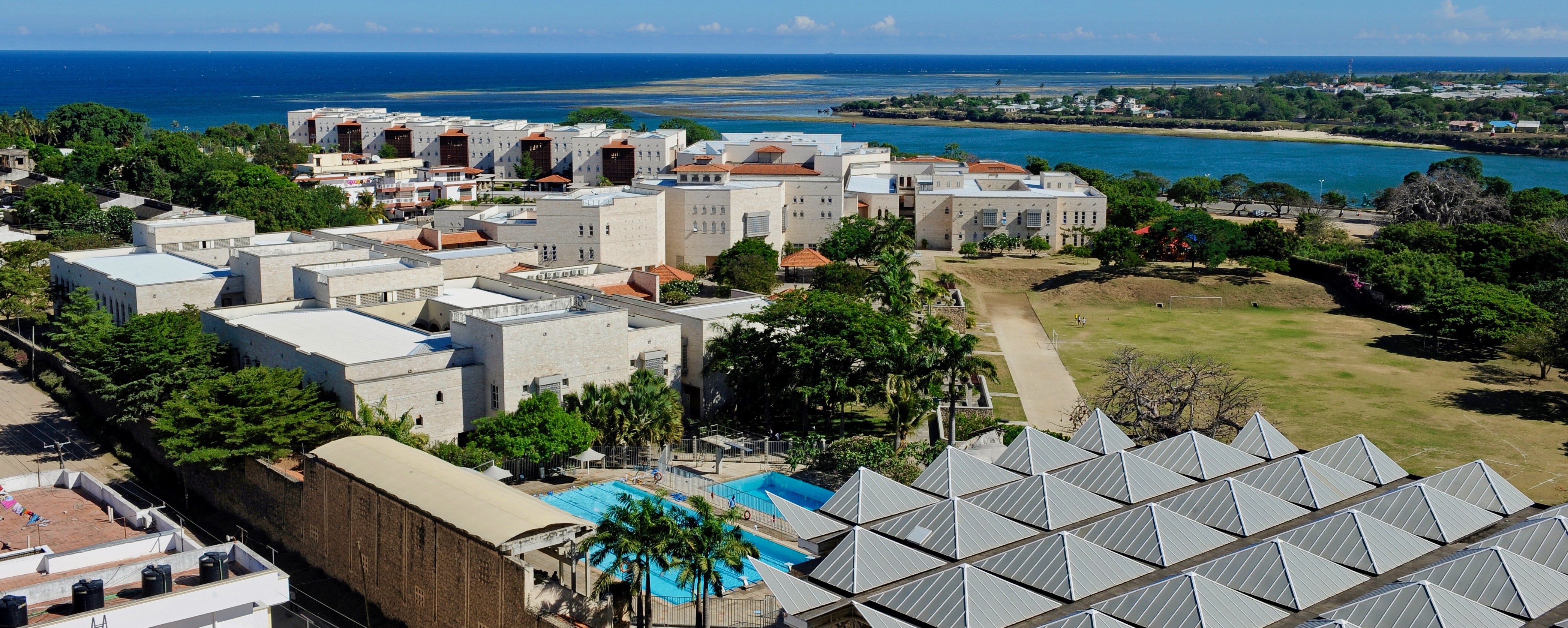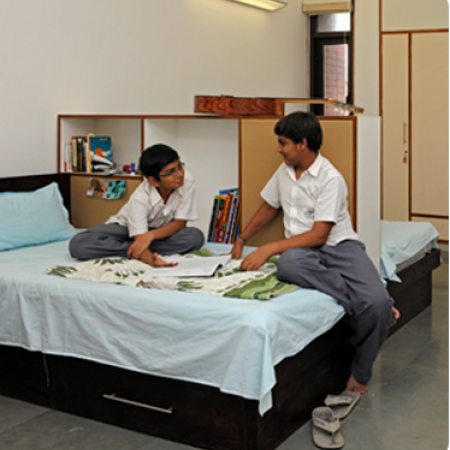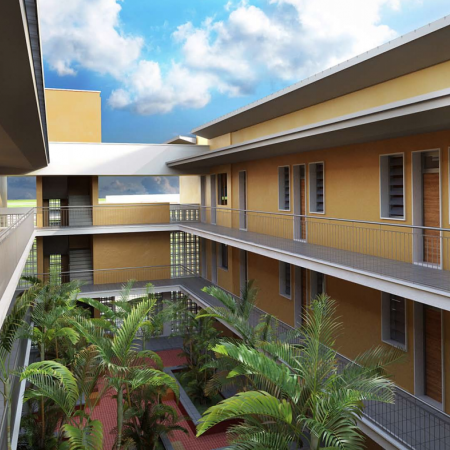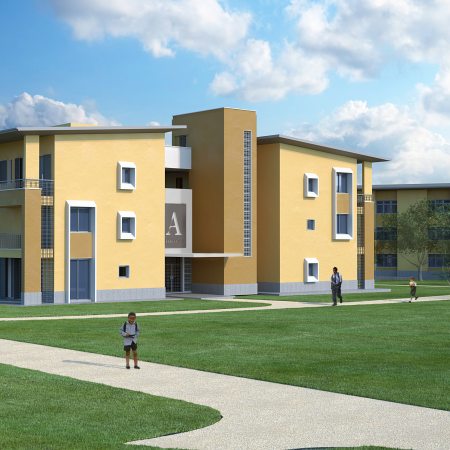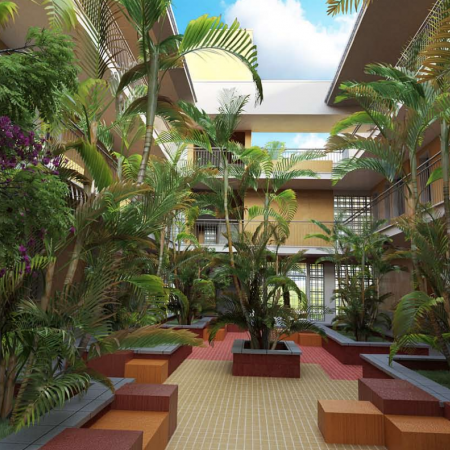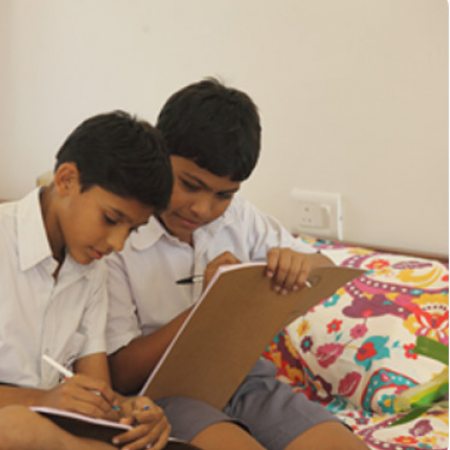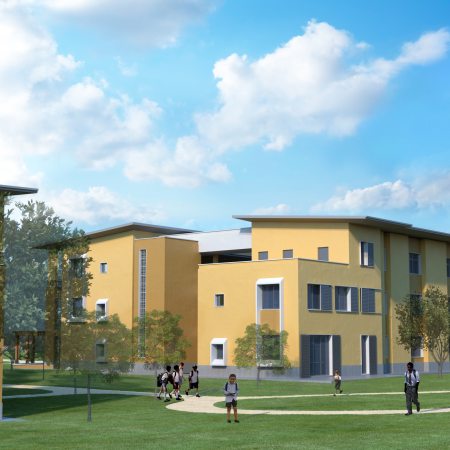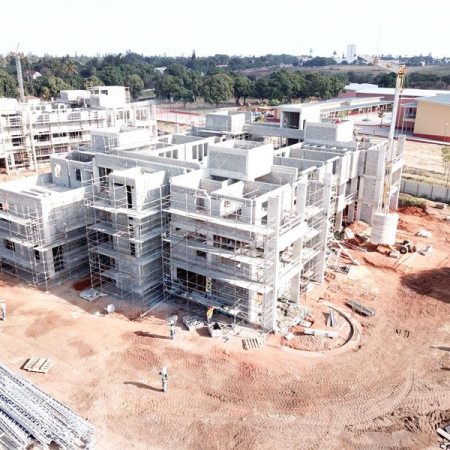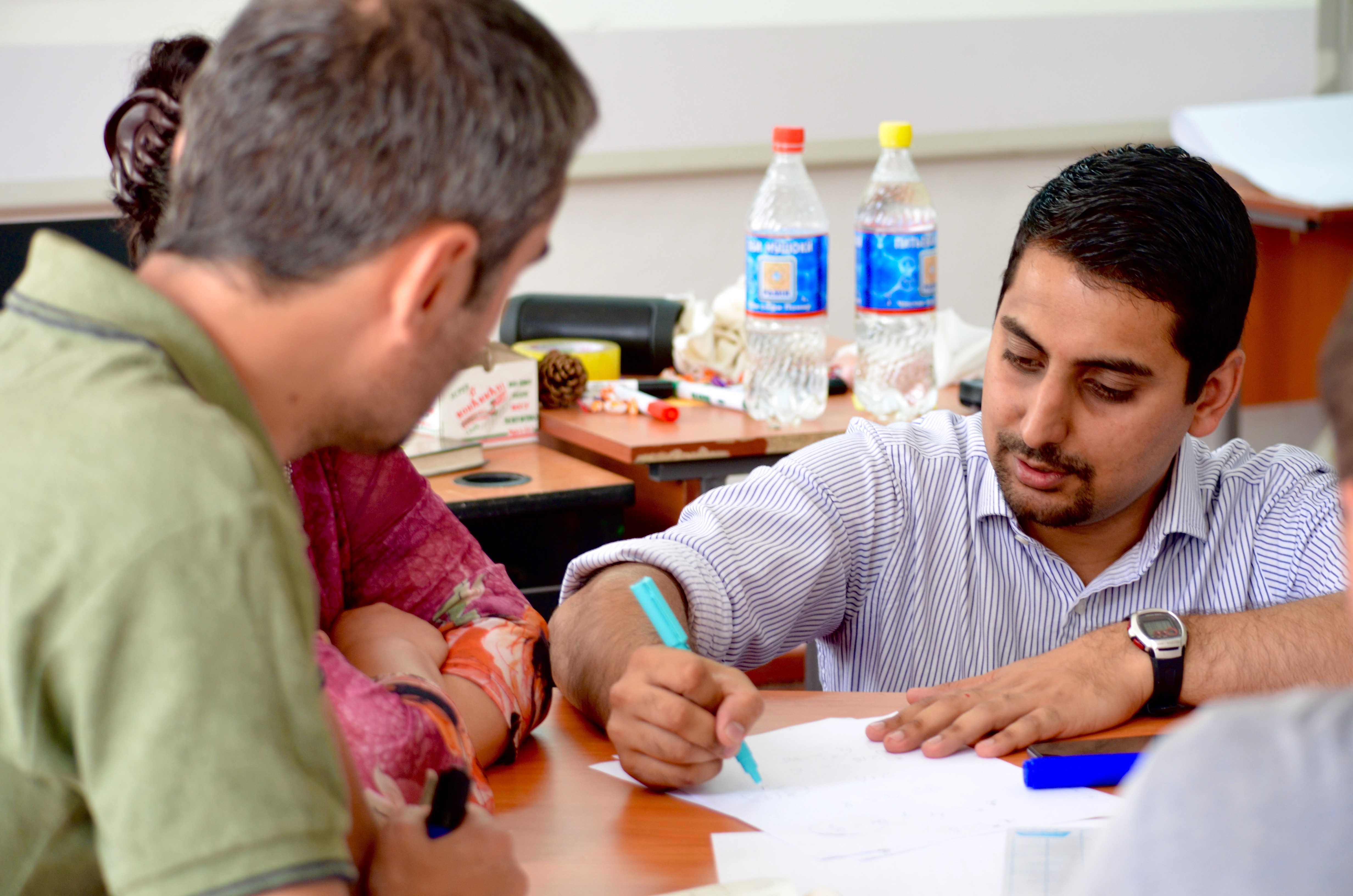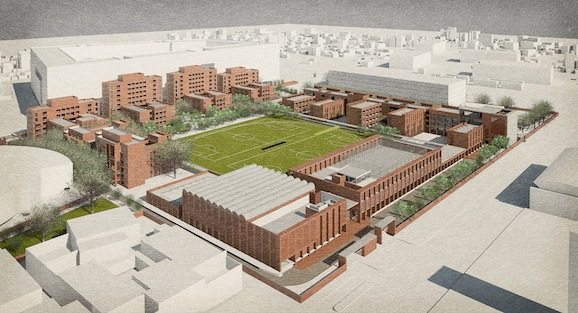
Our Campus
Built on a 17-acre site near Bashundara, Dhaka, the Aga Khan Academy Dhaka offers state-of-the art facilities on a secure, landscaped campus.
The Aga Khan Academy Dhaka is located on a 17-acre plot in Bashundara, Dhaka and will enrol 750 students (K-12) with a capacity to expand to 1,200. Residential facilities will be provided for students and staff to allow for wide participation and enable a diverse learning community. The school has been designed by renowned international architects to ensure the best possible educational experience in a physical environment that resonates with local Bangladeshi culture and architectural traditions.
The design for the Aga Khan Academy Dhaka received the award for best ‘Future Education’ project at the World Architecture Festival 2017, held on 15-17 November in Berlin, Germany. The award recognises the excellence of the school’s design as well as the project’s intention to generate positive social impact, which arises from the mission and values of the Aga Khan Academies and the wider Aga Khan Development Network (AKDN). The vision of the Academies is to develop future leaders with the skills and knowledge to positively support development in their own societies.
Construction of the Academy began in 2018, with the first batch of students being welcomed on campus in August 2022.
The Academy is the fourth in a network of about 18 planned Academies offering the highest international standard of education to students in countries across Africa, South and Central Asia, and the Middle East.
The campus has been specially designed by renowned architects and is purpose-built. Our facilities include the following academic and resource areas:
- subject and age-specific classrooms
- well-equipped science and computer laboratories
- library and resource centres
- rooms for the fine arts, music and dance, including individual practice booths and a music recording area.
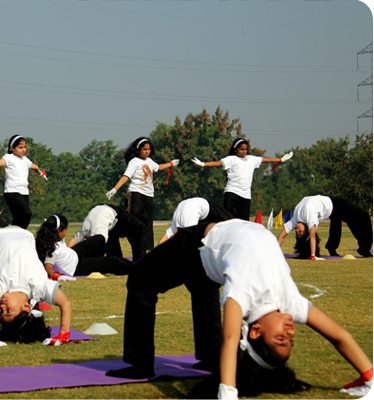 The Commons building will house the dining hall and an array of spaces for school activities. It is designed to be the hub of student activity, serving as the Academy’s main space for major school functions, including music and drama performances, and public lectures.
The Commons building will house the dining hall and an array of spaces for school activities. It is designed to be the hub of student activity, serving as the Academy’s main space for major school functions, including music and drama performances, and public lectures.
Sports facilities
Our sports facilities are extensive and, when complete, will include swimming and diving pools and fields for all sports.
We invite you to visit the Academy to take a tour of our campus.
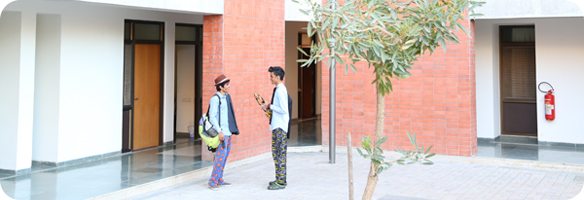
Living on Campus
Residential life at the Academy complements and extends the academic experience. Our residential programme includes a broad selection of activities and leadership opportunities to enhance students’ learning and growth.
The Academy’s residences include facilities to accommodate both students and teachers. Our residences house boarding students requiring accommodation as well as those participating in international exchanges between the Aga Khan Academy Hyderabad and other Academies and schools.
Teachers' quarters on campus house both resident and visiting faculty.
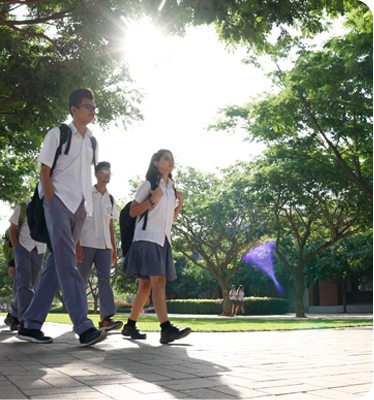 Learning beyond the classroom
Learning beyond the classroom
Our residential programme is about the learning and growth that comes through constant interaction with a diverse and talented group of teachers and peers.
Mealtimes and other gatherings provide our residential students with opportunities for informal interaction as well as for discussions, meetings, language tables and study groups.
The focus of the residential experience is on students’ intellectual, social, spiritual and physical growth in a structured and ethical environment. Many of the least tangible but most important elements of an education – the development of practical leadership skills, the capacity to make ethical judgments, the ability to navigate through complex cultural settings – are formed outside the classroom.
The safe and secure environment of the Academy’s boarding facilities gives students of all backgrounds the opportunity to thrive emotionally, intellectually and physically.
Meet our Team
The Aga Khan Academy Mombasa, a programme of the Aga Khan Development, is the first in a global network of 18 planned Academies.
We select a diverse group of students with exceptional academic and leadership potential, offering financial assistance where needed. We offer them a world-class International Baccalaureate (IB) education on a residential campus with outstanding facilities, preparing them to make a positive contribution to society.
Through our inquiry-based approach to learning, students develop independent and collaborative learning skills, problem-solving and critical thinking. We also ensure that students develop their gifts and talents through a wide range of sports, arts and cultural activities, nurturing the holistic development of each child. Our teachers are highly qualified, experienced and committed to their ongoing professional development.
The Aga Khan Academy Mombasa is a special place, where a sense of community and family runs through everything we do. We understand that you may not be able to make it to visit us, so we are visiting you!
To register for an upcoming parent information session or an assessment, please click here.
We look forward to meeting you in your city!
For any queries, please contact mba-admissions@agakhanacademies.org
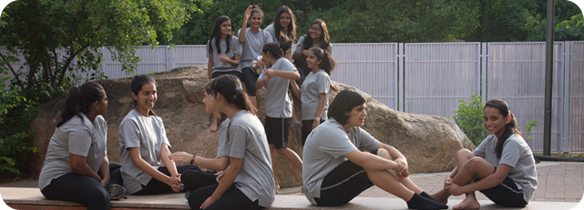
Residential Facilities
Our school culture is based on respect, integrity, honesty, fairness, empathy and good humour; and these values permeate the ethos of residential life.
The residential environment is warm and supportive, and this is reflected in the peaceful and inviting architecture of the residences. Boys and girls live in separate student residences, and all students are closely supervised by faculty and staff.
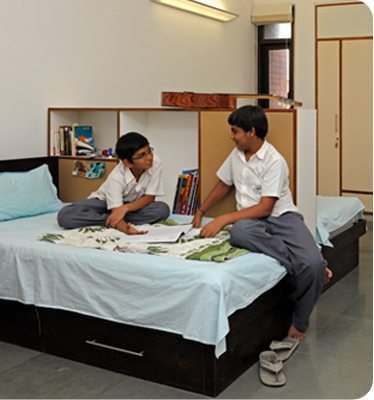 The adjustment to living away from home for the first time can be difficult for students. Our dorm parents are a carefully chosen group of teachers who live in faculty apartments in the residences. They ensure a safe, nurturing and fun-filled environment for students.
The adjustment to living away from home for the first time can be difficult for students. Our dorm parents are a carefully chosen group of teachers who live in faculty apartments in the residences. They ensure a safe, nurturing and fun-filled environment for students.
Dorm parents are trained in critical skills such as health and safety, community life and interpersonal relations. They possess a high level of energy to handle multiple tasks while offering guidance and support to the students.
We provide accommodation for members of the Academy community from both within the country and overseas, as well as those visiting or on exchange from another Aga Khan Academy.
Additional teachers' quarters on campus house resident faculty along with their families.
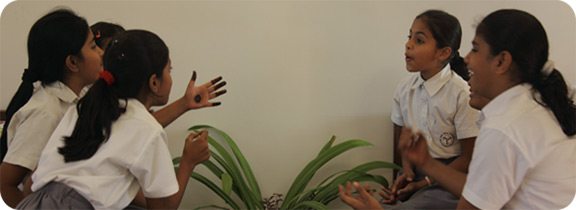
Community Service
Community service is a major part of the student experience at the Academy. Both the curriculum and student life incorporate aspects of community service.
Service opportunities extend the educational experience beyond the classroom and help our students learn about the real-world implications of their studies.
Through community projects with local organisations and groups, our students gain a sense of the connections between their education and the world around them. Students can participate in a variety of structured community initiatives and internships to learn about their place in the world.
 By partnering with local agencies of the Aga Khan Development Network, students learn first-hand about the operations of an organisation, and work toward making tangible contributions to the agencies.
By partnering with local agencies of the Aga Khan Development Network, students learn first-hand about the operations of an organisation, and work toward making tangible contributions to the agencies.
In addition, community engagement gives our students an understanding of broad concepts such as human rights, dignity and autonomy, while emphasising the ethos of leaving the world a better place.
To learn more about the Academy's programme, please visit the Academic Programme page.
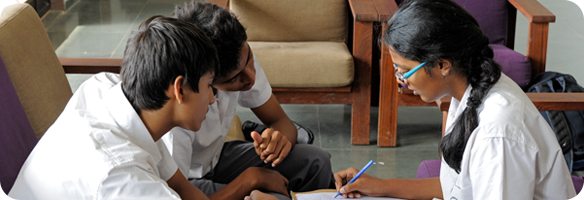
Application Forms
Application forms can be completed online using the links below or via the downloadable forms. Forms completed in hard copy should be either posted or scanned and emailed to the admissions office at the earliest opportunity. Applications should include the following:
- completed application form
- copies of the applicant’s last two grade reports
- a copy of the applicant’s birth certificate or passport
- a copy of Aadhaar card
- evidence of vaccination (Junior School)
- two passport-sized photographs
- application fee (non-refundable): INR 3,000.
*Please note that a completed financial aid form must be submitted together with the application form in order to apply for a bursary.
Address
Admissions Office
The Aga Khan Academy Hyderabad
Survey No: 1/1, Hardware Park
Maheshwaram Mandal, R.R. District
Hyderabad 501 510
Telangana, India
+91-40-66291300
Email: admissions.hyderabad@agakhanacademies.org
Online application forms
To access the online application service, please click on one of the options below.
Downloadable application forms
Click on the links below to download the application forms:
IB Primary Years Programme application form_2025-26.pdf
AKA Maputo Residential Programme
See some architectural drawings of the new residential campus along with some photos from our other Academies' residential programmes
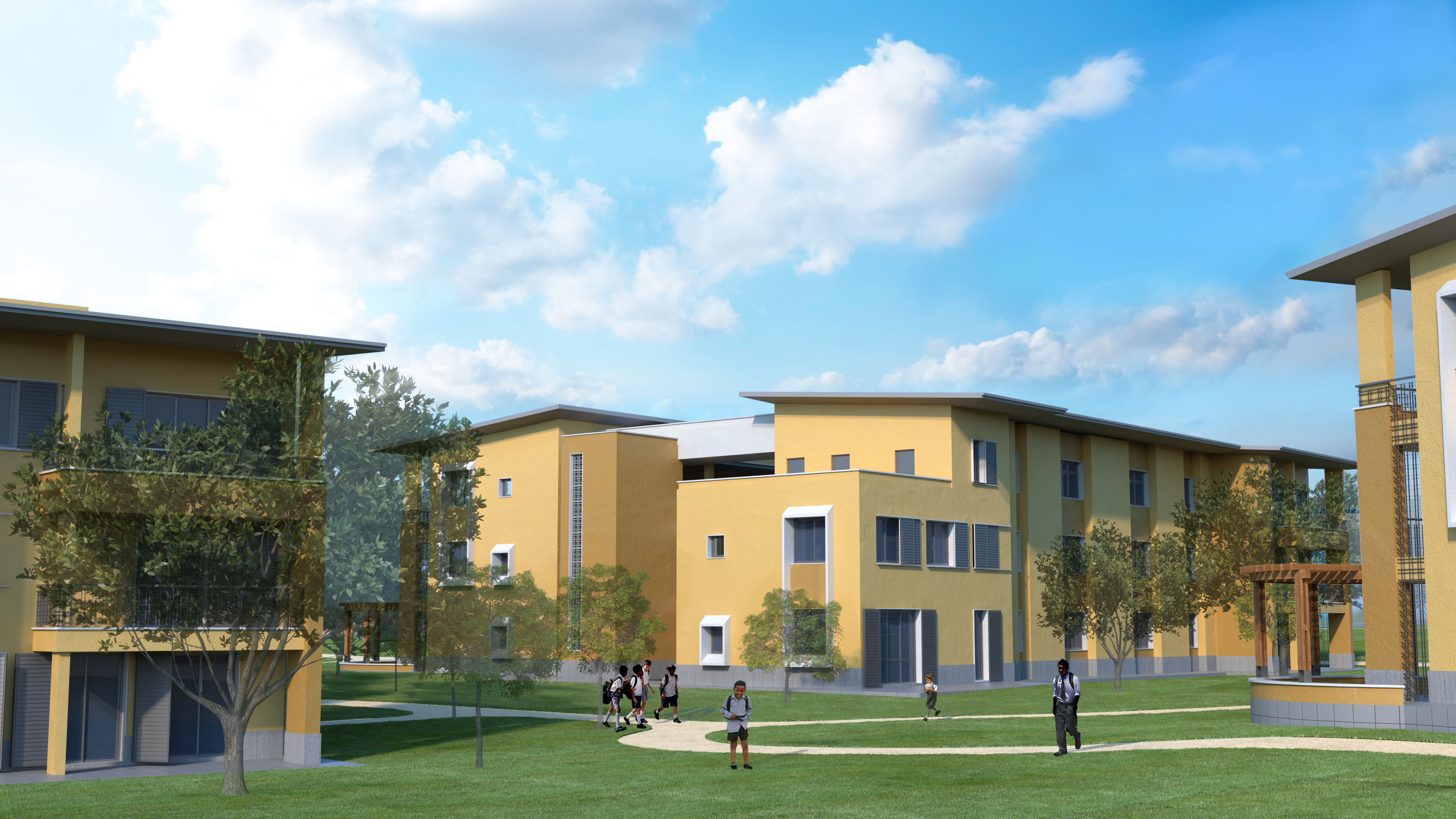
Karim Ismail : Empowering teachers to nurture leaders
Joining the Academy virtually for the new academic year 2020 - 2021, our new Senior School Principal is excited to provide support to our teachers and collaborate with them in order to make as big an impact as possible as a group.
From his university days, Karim Ismail knew he wanted to work with young people and has not looked back since. Grateful for the experiences during his education, he felt compelled to share the love for learning amongst youngsters and recreate those experiences for students around the world.
“Understanding how I could ensure that other students get similar opportunities to build their character and personality made it an easy career decision,” he shared on his choice to become a teacher.
Hailing from the UK, Karim’s journey as a teacher and school leader has taken him all over the world including Kenya, Uganda, India, South Africa and Mozambique to name a few. He was working at an IB institution when he was recruited as one of the founding teachers of the Senior School at the Aga Khan Academy Hyderabad. Having worked for the Academies and other IB institutions in various leadership capacities, Karim now joins the AKA Maputo as the Senior School Principal.
Reflecting back when he held a similar role in Hyderabad, he said there are a number of reasons why it was special for him. “The time spent in Hyderabad not only gave me the opportunities to contribute towards student and teacher development but was developmental for me as a teacher and a leader as well. And I was proud to see through our first cohort of graduates in the Diploma Programme. I have very fond memories of my time in Hyderabad.”
Identifying the impact of education policy and the influence of change at a systemic level, Karim has experience in non-classroom based roles as well. He has worked with many schools in order to build on existing capacities to improve potential and has qualified to train teachers to become IB certified which is something he still does today.
“Taking the opportunity to step out of the classroom and partner with schools to focus on their institutional improvement was eye-opening. I have had the privilege of visiting excellent institutions and seeing their practices in place, and learning on each occasion. Meeting and training IB teachers from all corners of the world allows you to understand those educational contexts and their valuable diversity. Inevitably this work brought me back to working with the Aga Khan Academies.”
In his visits to the AKA Maputo, he has played an important role in understanding how to improve upon the quality of mathematics education, looking at changes in curriculum as well as their implementation. He brings this same analytical eye to the Senior School where he is excited to work full time with his new colleagues in Maputo. Having worked with the teachers in Maputo on various occasions, Karim lauds the teachers at the Academy for their strong set of core values which resonate with him; enabling him to provide support and encourage teachers in their mission to nurture leaders.
“Students have huge potential to become leaders. And our teachers, in my opinion, are the only way we're going to achieve that. They are the key drivers of change. They’re going to influence minds. They're going to be the relationship holders with that student body. And so my role is very much to give the teachers what they need, provide that space and encouragement, be that support and give them resources to allow them to do that job to the best of their capability.”
Praising the Academy for its quick and comprehensive response to the challenges posed by COVID-19, he found the quality of the online programme comparable to some of the best on offer with regards to its points of contact, rich content and technical tools deployed therein. While he agrees that the unique in person contact experience cannot be replicated, the Academy strives to achieve similar outcomes.
“If you have good relationships with your students, you can get the most out of them and they can work with you to identify their barriers, to push through their challenges and go through their good and bad days knowing that they have that support as a constant anchor for them in the classroom, virtual or otherwise.”
But there have also been a few silver linings through this unprecedented time. Karim points out that online learning has allowed students to develop their own skills in terms of organisation, their independence as a learner as well as their self-reliance and grit which will be hugely important moving forward.
Highlighting another boon in the transition to online learning, he finds that it, “facilitates the opportunity to provide intervention and support that cannot always be offered in a physical classroom, and this can lead to a better understanding of students’ needs, and positive impact on their progress.” He adds that this can be applicable to mathematics, language learning and other areas whereby the faculty are equipped to individualise instruction, provide feedback in a more direct way to students and in essence, help them bridge some of their prior gaps and misconceptions in a more efficient way.
Feeling honoured and privileged to be serving in his new role, he said, “I recognise this opportunity to really support the vision of what we're trying to do at the Academy. For our students, it's one of the most unorthodox experiences they have had educationally and in their lives. And I'm heartened and proud of the way in which I've seen people demonstrate grit and perseverance to get through this. That's going to make them stronger people.”
“And as we come back together as a physical school community in the future, I look forward to sharing those experiences, strengthening our Academy community, and appreciating the stimulation and freedom that comes with access to schooling. We have an incredibly exciting journey ahead.”
